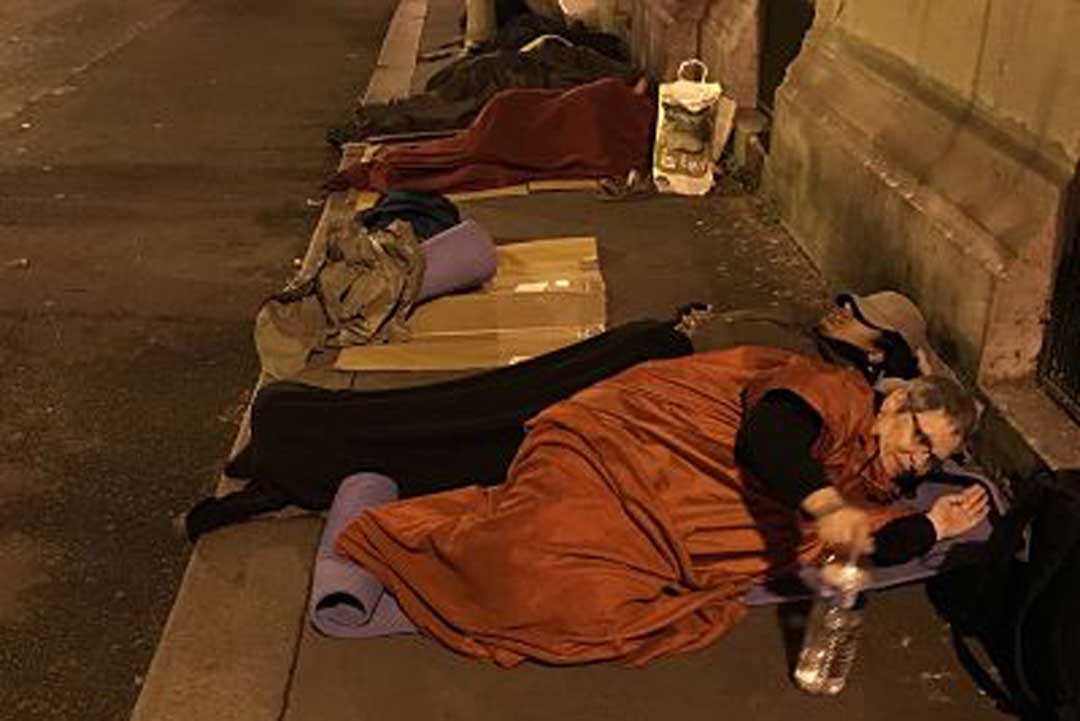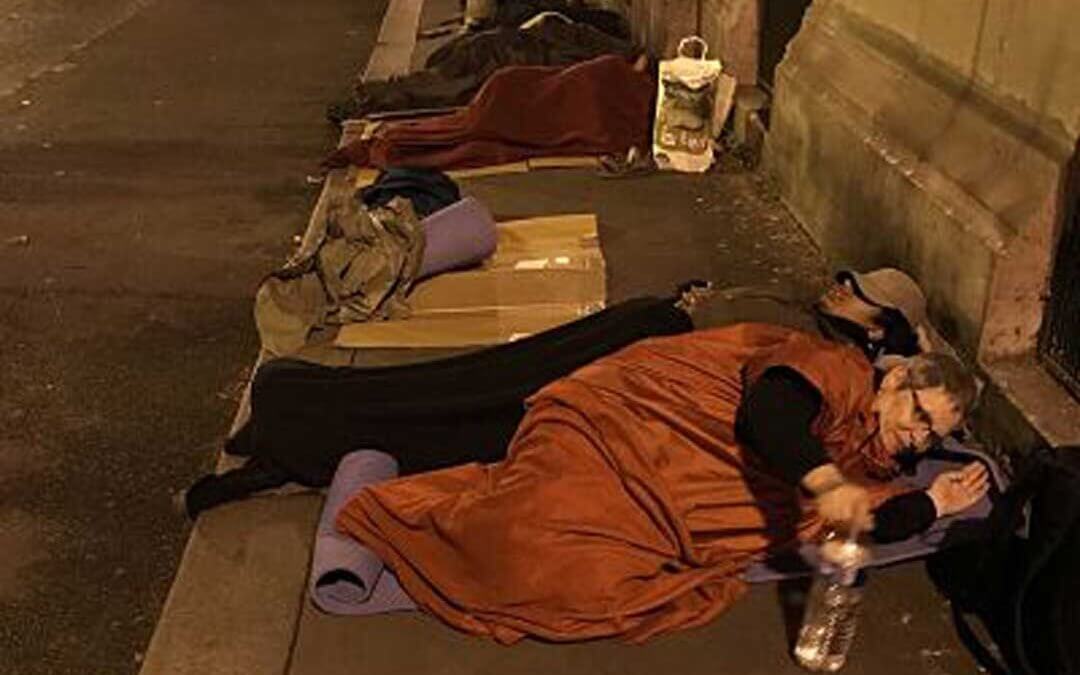Bernie Glassman and Zenpeacemakers/The deep meaning of begging for malas/street retreats
In 2007 I must have heard about Zenpeacemakers, probably through the Dharma teacher Werner Heidenreich, who told me about a meeting in Germany, perhaps in Solingen. I remember being fascinated, I had never heard of anything like it. Among other things, it was also about donations that participants would bring as a „mala“, a prayer chain, to the corresponding „witnessing retreats“. That was a tidy sum that I read about: Even for street retreats, one had to go begging – this is said with the utmost respect – because Bernie demanded of his adepts that they should shed any acquired shame and shyness about speaking about our spiritually deepest desires, practices, and thus also inspire others.
However, it had then taken me a few more years to show up for the first time in Auschwitz at one of these large group retreats – I asked for beads for almost all the retreats and sesshins in Seattle! – and then another six or seven years until I would actually beg for beads (one bead for every amount of money donated), for my first street retreat.
Why does Bernie come to mind more often right now? For one thing, November is approaching, the month with the High Holy Days of Mourning, the month with the annual Auschwitz retreat. I have participated in five with the Zen Master, and my last one with him, not under his direction, was in 2015 in the Black Hills, in South Dakota: the Native-American-Black-Hills-Bearing Witness Retreat. This extraordinary retreat was led by a Lakota elder named Tiokasin Ghosthorse and his team, whom I had experienced twice in Auschwitz in the years before, as a participant like myself. We sat in the same council (heart circle talk) in the morning, and I listened to his contributions and his excellent flute playing with great attention…In the meantime, our Zen Peacemaker Order founder, teacher and grandfather has sadly passed away: In November, just during the Auschwitz Retreat 2018. That’s how strongly Bernie was connected to this long-term project in Europe. Countless souls will be grateful to him and his second wife Sandra Holmes and his third wife Eve Marko, both also Zen masters, and his spiritual companions. As will I, like so many others.
 When we got together at the street retreats with Michel Dubois in the first circle discussion, most of us also talked about „the joys and sorrows“ of making their mala. I can roughly say that we lost friends and made new ones along the way. A bitter and sweet experience for everyone, by the way, including Jewish friends. At first, I thought it was typical of Germans to roll their eyes – inwardly or outwardly – when they heard about further requests for donations for Auschwitz, the place of shame in German family history. „There has to be an end to Auschwitz remembrance at some point,“ said those who had never commemorated it. Then it goes on with the homeless, who themselves were somewhere to blame if they couldn’t get off their butts. Besides, aren’t there enough other poor people in Germany who could be taken care of? There certainly are! Show me the project you’re passionate about and I’ll support it. Aha, that’s not what I meant, so specific. But Bernie always meant it in concrete terms, Zen should also be concrete. Saving beings, freeing them, could be so concrete and practical!
When we got together at the street retreats with Michel Dubois in the first circle discussion, most of us also talked about „the joys and sorrows“ of making their mala. I can roughly say that we lost friends and made new ones along the way. A bitter and sweet experience for everyone, by the way, including Jewish friends. At first, I thought it was typical of Germans to roll their eyes – inwardly or outwardly – when they heard about further requests for donations for Auschwitz, the place of shame in German family history. „There has to be an end to Auschwitz remembrance at some point,“ said those who had never commemorated it. Then it goes on with the homeless, who themselves were somewhere to blame if they couldn’t get off their butts. Besides, aren’t there enough other poor people in Germany who could be taken care of? There certainly are! Show me the project you’re passionate about and I’ll support it. Aha, that’s not what I meant, so specific. But Bernie always meant it in concrete terms, Zen should also be concrete. Saving beings, freeing them, could be so concrete and practical!
The person who organised the street retreat made enquiries beforehand – at least roughly – about the route, the places where you could spend the night, and contacted aid organisations along the way/in the neighbourhood/city. You should know where the markets are, where you can and may pick up fruit and vegetables from the ground, where homeless people and illegal immigrants are helped, where the group could stop by for a cup of tea, a meal, a chat or even a shower. You get to know your neighbourhood from the bottom up, from the street.
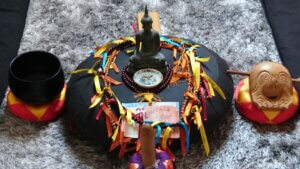 I come back to the Mala. In the last circle discussion of each street retreat, a vote is taken on which aid organisation the group would like to hand over the money raised. Sometimes it is split between two organisations. Collegial friendships are formed or strengthened. People support each other. In Paris, for example, food can no longer be thrown away. I remember this important issue from a few years ago, when my friends in Paris from Dana-Center and Zen-Voie-du-Coeur fought for this regulation and organised transports to bring food from here to there to be passed on or processed. Countless arms and hands had meant that Indra’s network included not only the friends who had donated to our prayer chains, but also everyone we met on the street, as well as our helpers and friends and theirs.
I come back to the Mala. In the last circle discussion of each street retreat, a vote is taken on which aid organisation the group would like to hand over the money raised. Sometimes it is split between two organisations. Collegial friendships are formed or strengthened. People support each other. In Paris, for example, food can no longer be thrown away. I remember this important issue from a few years ago, when my friends in Paris from Dana-Center and Zen-Voie-du-Coeur fought for this regulation and organised transports to bring food from here to there to be passed on or processed. Countless arms and hands had meant that Indra’s network included not only the friends who had donated to our prayer chains, but also everyone we met on the street, as well as our helpers and friends and theirs.
How is that meant?
Bernie’s idea with the donation mala is simply brilliant. He always wanted us to realize that we are never alone and that we never act alone. What we did for our small circle at home, which perhaps practiced the Zenpeacemaker vows, reflected together and planned actions, would have an impact on every single participant in such a circle. After all, this participant would pass on what inspired her. If we now collected donations, we would also carry on the flame of our commitment. We tell the donors that we would always wear the necklace during our retreat, that it gave us comfort and connection. Some are very touched when they hear this and ask to be informed about the days on the road. They also tell others!
But there is something else, something at least as deep. Many of us have a deep-seated shyness, especially when it comes to this topic of „street retreat“. It’s not just the obvious: You’re afraid of the discomfort, the lack of hygiene, the nights – you honestly can’t imagine it at all! It’s beyond imagination. We are also justifiably shy and ashamed to do the same. It’s as if we’re cheaply ingratiating ourselves, pretending to share their lives, but in reality we can always go to the organiser’s house, take a shower, eat, go to bed and carry on with our lives in comfort.
Let me tell you: none of this is true. These are all arguments we use to protect ourselves from the experience and deep connection. The guidelines that the Zenpeacemakers have set up come from living experience and maximize *Experience *Connection *Trust
*Experience – think little/become one with the road/notice the back door
You are only allowed to take what you are wearing. That’s why some have thicker raincoats that you can sleep on or cover yourself with, a wide-brimmed hat, the most comfortable shoes, several layers of discarded clothing. A plastic bag with a blanket or sleeping bag is permitted. Medicine, possibly a pair of pants.
NO mobile phone, no money. Possibly identity card, I don’t remember that.
Nobody goes „home“ in between.
These rules ensure maximum experience and group stability.
*Connection – How do we approach the inhabitants of the street?
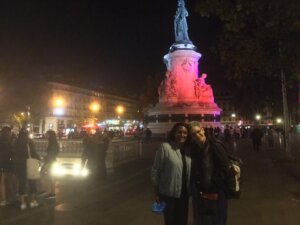 Everyone finds out for themselves. The money collected is „given back to the street“. This argument has always been received with great interest: From homeless people themselves, who asked about our motives when we told them about our project. From interested passers-by from whom we begged money for coffee or similar. Otherwise it was all too easy to assume that we were predominantly trying to fulfil narcissistic needs. Of course, such scepticism is appropriate, I think it is appropriate to feel that we are also nourishing one or more of our own needs with this practice. This view – I always referred to it as a „social experiment“ – also appealed to the homeless people themselves, but they met us, all of them, far more openly, happily and generously than one could have imagined before. They don’t even have such suspicious thoughts. Why? My conjecture is: because they KNOW: it is totally rare that „Those who have something“ voluntarily put themselves on the same level as have-nots, it is a different, very hard life that holds beauties in store that are only accessible to those who dare. Two whole days are enough, even one day without money, umbrella, mobile phone, book…surely you will get hungry or thirsty at some point, and then it gets interesting. Have you ever begged for food in your city? I just remembered what it was like in Bonn. You have all the time in the world. You look completely different, you obviously look different. You’re not sitting in a café. That’s very exciting. Which toilets do you go to? Do you go to aid organisations? Where is the soup kitchen, the food bank again?
Everyone finds out for themselves. The money collected is „given back to the street“. This argument has always been received with great interest: From homeless people themselves, who asked about our motives when we told them about our project. From interested passers-by from whom we begged money for coffee or similar. Otherwise it was all too easy to assume that we were predominantly trying to fulfil narcissistic needs. Of course, such scepticism is appropriate, I think it is appropriate to feel that we are also nourishing one or more of our own needs with this practice. This view – I always referred to it as a „social experiment“ – also appealed to the homeless people themselves, but they met us, all of them, far more openly, happily and generously than one could have imagined before. They don’t even have such suspicious thoughts. Why? My conjecture is: because they KNOW: it is totally rare that „Those who have something“ voluntarily put themselves on the same level as have-nots, it is a different, very hard life that holds beauties in store that are only accessible to those who dare. Two whole days are enough, even one day without money, umbrella, mobile phone, book…surely you will get hungry or thirsty at some point, and then it gets interesting. Have you ever begged for food in your city? I just remembered what it was like in Bonn. You have all the time in the world. You look completely different, you obviously look different. You’re not sitting in a café. That’s very exciting. Which toilets do you go to? Do you go to aid organisations? Where is the soup kitchen, the food bank again?
I once shared the money I had begged for with a man with a dog in Remigiusstraße. He was extremely happy. People love the fact that you are at all interested in them, in their lives, that you give up comfort because of them. For me, for them, THAT is true solidarity: we have to sacrifice something, without a sacrificial face: what we give away returns many times over.
A connection is formed with the street and its inhabitants.
*Trust – trust grows on all sides.
You slowly become a have-not. In knowledge. Wisdom. Necessities. You have your companions with you. The one who keeps watch at night so that you can sleep without worrying or go to the toilet block in the pitch dark, on the old railway tracks near the crossing. The one you sat with in the street with the expensive boutiques and begged. What a joy it was when you ended up with enough money to make everyone happy and buy them a coffee. With the other friend you were almost „lying“ under the market stall picking up fallen tomatoes, still fishing edible strawberries out of a mountain of cardboard boxes. Someone saw us and waved us over: Voila, he said with a smile, and handed over a baguette.
That first breakfast in the park by the fountain was a gift I’ll never forget. And yes, waking up in the morning – marvellous. You simply got up from the cardboard camp, looked in amazement at your friends, took your plastic bag and went to the „pee station“. Compared to Germany, Paris is a paradise when it comes to toilet blocks. These self-cleaning, grey, spacious cubicles and the public fountains, together with the fact that nobody gets upset when homeless people sit on the bus without a ticket, make life comparatively more pleasant. Of course, we also became resourceful when it came to natural toilets, and someone had managed to get hold of toilet paper or paper handkerchiefs. Walking through the park in the still dewy grass, looking for a place for the first heart circle – was there anything more sensible? I can still see today how Roshi rubbed his back and said something very quickly in French, whereupon everyone burst into roaring laughter. I got used to not being able to understand a lot of things. Of course I improved my French, but I never learnt to follow fast colloquial French.
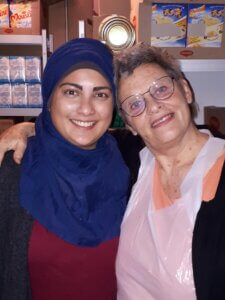 The living conditions for homeless people, as described above (toilets, water, comprehensive provision of food outlets such as „Restaurant du Coeur“: this project, which was open every day at lunchtime and served healthy food) were additional reasons why refugees who had first arrived in Germany via Lampedusa had moved on from here to Paris. I say „additional“ because the asylum laws naturally also played a major role, if not the biggest. I shared precious time with two of these refugees, with whom I was able to talk about more than just the hot spot on Lampedusa, during the second Paris retreat while we waited for the long table to open, where breakfast was about to be served. But I will also report on this moving conversation in more detail in a separate post on the subject.
The living conditions for homeless people, as described above (toilets, water, comprehensive provision of food outlets such as „Restaurant du Coeur“: this project, which was open every day at lunchtime and served healthy food) were additional reasons why refugees who had first arrived in Germany via Lampedusa had moved on from here to Paris. I say „additional“ because the asylum laws naturally also played a major role, if not the biggest. I shared precious time with two of these refugees, with whom I was able to talk about more than just the hot spot on Lampedusa, during the second Paris retreat while we waited for the long table to open, where breakfast was about to be served. But I will also report on this moving conversation in more detail in a separate post on the subject.
One last point became important to me yesterday. Someone had spoken about how important it is for our humanity to recognize and express our own neediness. According to the speaker, it is much more difficult to ask for help, to „beg“, than to give. I would add: This is because we experience ourselves as powerful, as „haves“. Apart from the fact that the person who asks is also a giver, but perhaps more subtle, I would like to agree in this context. Bernie had mentioned this point again and again. If we want to grow spiritually and meet as many people as possible, it is important to practice this position. People who were used to always having sufficient material resources at their disposal found this exercise particularly difficult. For example, they were allowed to learn to talk about their shyness and shame, or to be creative and beg for a friend or a project. Or: to simply donate several times over to the aid organisation „on the street“.
We all realized how limited we think and feel, how derogatory and full of prejudices we think and speak about people with whom we have never exchanged an honest word. And of course we also judge ourselves harshly and mercilessly. The two always go hand in hand.
I’m coming to the end for today: I can write again. I’m in the flow. The many texts that are piled up inside me: Gradually and generously, I give them space. And the writer’s block is melting away.
